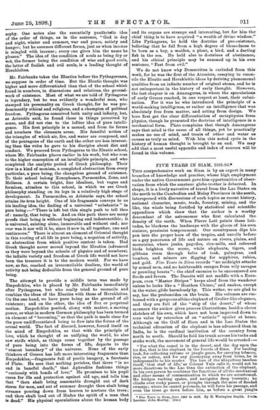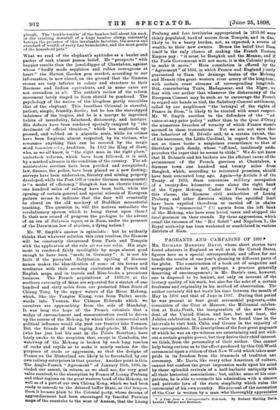FIVE YEARS IN SIAM, 1891-96.*
THIS comprehensive work on Siam is by an expert in many branches of knowledge and practice, whose high employment under the native Government gave him opportunities of obser- vation from which the amateur globe-trotter is debarred. In shape, it is a lively narrative of travel from the Lao States on the north to the Cambodian and Malay Provinces in the south, interspersed with discussions of such topics as recent history, national character, music, trade, forestry, mining, and the
like, the whole being fortified by statistical and scientific appendixes which show that the author is a worthy descendant of the astronomer who first calculated the density of the earth. When Pierre Loti paints these lati- tudes, he blackens the landscape with the gloom of his own sinister, pessimist temperament. Our countryman dips his pen into the proper hues of the tropics, and unrolls before us a gay panorama of life and nature on rivers, plains, and mountains, where junks, pagodas, rice-mills, and coloured birds brighten the scene, while elephants, tigers, and gibbons roam through belts of teak, palmyras, and bamboo, and miners are digging for sapphires, rubies, and gold. Five Years in Siam records "no midnight attacks- by armed men, and no hairbreadth escapes from wily savages or prowling beasts " : the chief enemies to be encountered are floods and fevers. The Dacoits will not meddle with a Euro- pean, even "Master Stripes" keeps aloof from the wanderer unless he looks like a " Heathen Chinee," and snakes, except in the water, glide harmlessly by. This writer, we are glad to say, has the proboscidea on the brain. His volumes are ern- bossed with a gorgeous albino elephant of Grolier-like elegance, and they are full of the " ship of the desert," of whose manners the author gives process illustrations, besides clever sketches of his own, which have not been improved down to zero value by retouches of an " artistic " spoiler at home.
Although on the Gulf of Siam and in the Lao States the technical education of the elephant is less advanced than in India, he is the cardinal institution of the country from north to south. Should he fold his trunk across his tusks and strike work, the movement of general life would be arrested
"For what the camel is in the desert, and the dog upon the ice floe, that is the elephant in the forests of Siam. For hauling teak, for collecting rattans or jungle grass, for carrying tobacco, rice, or cotton, and for any journeying away from home, he is indispensable to his master. The loss of the ubiquitous bamboo itself, ' that staff of life,' as Colonel Yule calls it, would not be more disastrous to the Lao than the extinction of the elephant. In his own person he combines the functions of all the mechanical and other means of communication to which we are accustomed. He bridges rushing spates, and navigates deep torrents ; he climbs over rocky passes, or ploughs through the mire of flooded swamps; where he cannot persuade, he will force his passage, and even the trees go down before him, as before a great jungle • Fire Years in Siam, from 1891 to /898. By H. Warington Smyth. 2 yob. London: John Murray. Pls.] plough. The tunkle-tunkle ' of the bamboo bell about his neck, or the crashing downfall of a huge bamboo clump, constantly betrays the presence of this invaluable factotum, the source and standard of wealth of every Lao householder, and the most gentle of the household pets."
What we read of the elephant's aptitudes as a hauler and packer of teak almost passes belief. He " prospects " with happier results than the jewel-digger of Chantabun, against whose " lordly made sapphires and rubies courageous at heart" the Hatton Garden gem market, according to our information, is now closed, on the ground that the Siamese stones are very inferior in colour and structure to their Burmese and Indian equivalents, and in some cases are not corundum at all. The author's review of the reform movement lately staged in Siam should be pondered. The psychology of the native of the kingdom partly resembles that of the elephant. This beardless Oriental is cheerful, patient, simple, friendly, docile ; but he has the stereotyped indolence of the tropics, and he is a martyr to ingrained habits of incredulity, falsehood, dishonesty, and intrigue. His defects have been rendered specially rampant by " the devilment of official thraldom," which has neglected, op- pressed, and robbed on a gigantic scale, while its crimes have been forgiven, almost respected, by its victims, who reverence anything that can be covered by the magic word tammiem—i.e., tradition. In 1S92 the King of Siam, who, as we all know, is " the right man in the right place," undertook reforms, which have been followed, it is said, by a marked advance in the condition of the country. The ad- ministrative services have been purified and reorganised ; law, finance, the police, have been placed on a new footing; surveys have been undertaken, forestry and mining properly developed, while the Post Office (under German management) is "a model of efficiency," Bangkok has an electric tram (!) one hundred miles of railway have been built, while the opening of certain general and special schools of European pattern seems to indicate that the door will eventually be closed on the old mockery of Buddhist monasterial teaching. The question is, will the natives assimilate the revolutionary system which is being thrust upon them ? Is their new record of progress the prologue to the advent of an era of Saturnia regna, or is Siam, under the pressure of the Darwinian law of atavism, a dying nation ?
Mr. W. Smyth's answer is optimistic : but he evidently thinks that whatever solution this crux receives, the Siamese will be constantly threatened from Paris and Tonquin with the application of the rule sic vos non vobis. His argu- ment is rendered fairly intelligible by maps almost good enough to have been "made in Germany ": it is not his fault if the prevalent Babylonian spelling of Siamese
names makes the identification of some of his towns and territories with their seeming equivalents on French and English maps, and in travels and Blue-books, a precarious business. The French acquisitions of 1893-96 at the northern extremity of Siam are separated for a stretch of one hundred and sixty miles from our protected Shan State of Chieng Tung by the upper waters of the River Mekong, which, like the Yangtse Kiang, runs from Thibet south- wards into Yunnan, the Chinese Eldorado which we
ourselves are approaching from the side of Mandalay. It was long the hope of the French colonials that a wedge of encroachment and communication could be driven up the course of the Mekong, by which their commercial and political influence would slip past our frontier into Yunnan.
But the friends of that raging Anglophobe, M. Deloncle (who has just lost his seat in the Palais Bourbon), have lately awoke to the suspicion that, except in Cambodia, the waterway of the Mekong is broken by such long reaches of rocks and rapids as to make it nearly useless for the purposes of trade or aggression, so that the designs of France on the Hinterland are likely to be forestalled by our own railway enterprises in that quarter. Another point is this. The Anglo-French " Agreement " of January 15th, 1896, in- cluded our assent, in return, as we shall see, for very good value received, to the absorption by France of Luang Prabang and other regions on the great western bend of the Mekong, as well as of a part of our own Chieng Keng, which we had been
ready to concede to the debated buffer State, or etat tampon. i boon it became plain to the Colonial party, whose dreams of aggrandisement had been encouraged by fanciful Parisian maps of the countries to the west of Annam, that the Luang
Prabang and Lao territories appropriated in 1893-96 were thinly populated, hard of access from Tonquin, and in fine, likely to be a heavy burden, not, as expected, a source of wealth, to their new owners. Hence the belief that Siam itself is the only chance of making the French Eastern Empire pay : "it must be Bangkok and the Menam, and if the Paris Government will not move, it is the Colonial policy to make it move." Here consolation is offered by the " Agreement " of 1896, in which France and England jointly guaranteed to Siam the drainage basins of the Mekong and Menem (the great western river artery of the kingdom), with certain coast streams of corresponding longitude. But, remembering Tunis, Madagascar, and the Niger, we fear with our author that whenever the disharmony of the European Concert may be such as to encourage the French to regard our hands as tied, the Salisbury-Conrcel settlement, called by our neighbours " the betrayal of the rights of France in Siam," is likely to be treated with scant respect, Mr. W. Smyth ascribes to the defenders of the "ad- vance-at-any-price policy " rather than to the Quai d'Orsay the numerous breaches of veracity of which France stands accused in these transactions. Yet we are not sore that the behaviour of M. Develle and, to a certain extent, that of his successor, the Little Cardinal, in regard to Siam, has not at times borne a suspicious resemblance to that of Sheridan's park dandy, whose "off-heel, insidiously aside, provokes the caper that he seems to chide." We do not know that M. Deloncle and his backers are the efficient cause of the permanence of the French garrison at Chantabun, a Siamese town one hundred and twenty miles from Bangkok, which, according to reiterated promises, should have been evacuated long ago. Again—by Article 3 of the Treaty of 1893, Siam renounces military occupation of a twenty-five kilometer zone along the right bank of the Upper Mekong. Under the French reading of this clause, the Siamese civil authorities of Luang Prabang and other districts within the specified limit have been expelled therefrom or carried off in chains by French " commercial " (! !) agents from the left bank of the Mekong, who have even levied taxes and stopped the local postmen on their rounds. By these aggressions, which recall the excesses of the " Roi Soleil " and Napoleon I., the Royal authority has been weakened or annihilated in various districts of Siam.



















































 Previous page
Previous page